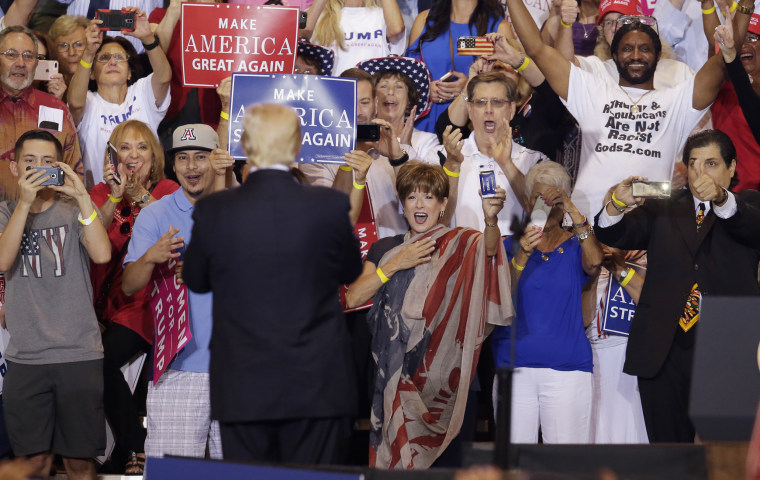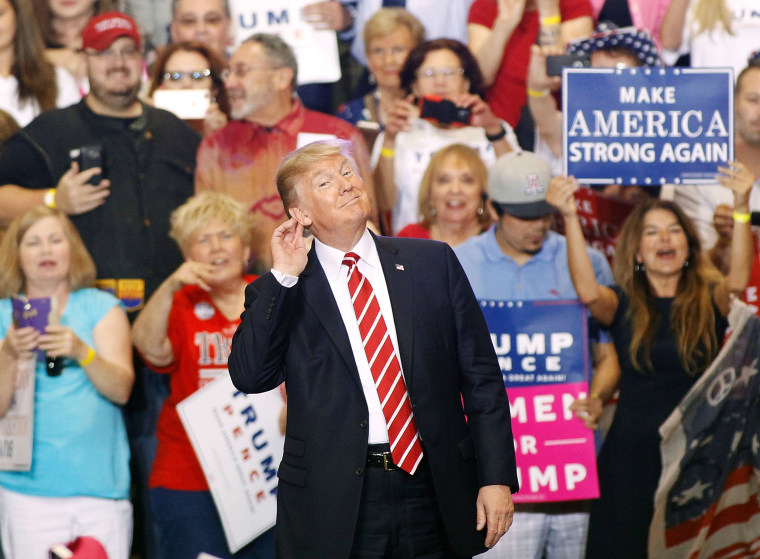The American tradition is not deference to authority; it's defiance of authority, even when the cause is hopeless. Sociologist Seymour Martin Lipset once wrote that the United States was, in fact, peopled by “runaways from authority” — settlers seeking freedom from abusive governments and members of dissenting religions seeking freedom from established churches.
Defiance is Donald J. Trump's signature attitude; it was the defining characteristic of the 2016 Trump campaign. Trump defied the political establishment, the news media, conventional wisdom, common decency, former President George W. Bush, Senator John McCain (R-Ariz.), former GOP presidential nominee Mitt Romney and even the pope.
Trump's supporters admire his defiance, which they see as fearlessness. They share his contempt for the establishment, the news media, educated elites and the norms of political correctness, all of which helps explain why Trump's base is sticking with him now that he has antagonized the entire national establishment.
In the latest NBC News-Wall Street Journal poll, Trump's job approval rating is down to 38 percent, but 81 percent of Republicans are standing by their president. “We have, actually, great unity in the Republican Party,” Trump boasted.
The Republican Party is now the Trump party: “There is zero appetite for the ‘Never Trump’ movement in the Republican Party of today,” an adviser to a pro-Trump super PAC told the New York Times. “The party is now defined by President Trump and his movement.”
Are Republican voters dismayed by the indictments coming from the special counsel? Not at all. To Trump and to his base, special counsel Robert Mueller represents the national establishment passing judgment on the president.
Trump's response to the investigation? Defiance: “Why aren't Crooked Hillary and the Dems the focus?” Trump tweeted. And now, some Republican lawmakers are pressuring the Justice Department to name a second special counsel to investigate Hillary Clinton and the Clinton Foundation. Such a move would instantly destroy the norm, established after the Watergate scandal, that the White House should never use law enforcement agencies to go after political enemies.

There are, in fact, harsh criticisms of Trump coming from respected Republicans: Senators Jeff Flake (R-Ariz.), Bob Corker (R-Tenn.) and former President George W. Bush can speak out because they are not running for re-election. Otherwise, elected Republicans are conspicuously silent: They apparently don't want to face retribution from angry Trump supporters who will rally behind a Republican primary opponent.
Trump's commitment to tax reform further solidifies his Republican support. Tax reform — more precisely, tax cuts — is the issue that has defined the Republican Party since Reagan. Republicans, who normally trumpet fiscal conservatism, aren’t even worried that the tax cuts will increase the federal deficit: Fewer than one in five Republicans believe the he tax changes will increase the deficit.
And Trump got a rapturous reception at the Values Voter Summit last month, though the casually observant, thrice-married president hardly exemplifies conservative Christian values. Religious right voters are not attracted to Trump because of his lifestyle; they're attracted to him because he's a street fighter who will do whatever it takes to get them what they want. (The House Republican tax bill, for instance, includes provisions that would give rights to unborn children and allow tax-exempt religious organizations to engage in political activity.)
The deep divisions in American politics started long before Trump came into the picture. But what Trump did was exploit the division. As Bush put it, “You can either exploit the anger, incite it. Or you can come up with ideas to deal with it.”
Democrats have been responding with their own show of defiance: The day after Trump took office in January, the anti-Trump resistance movement sprang up and staged the Women's March on Washington, the largest political demonstration since the anti-Vietnam War protests of the 1960s and ‘70s. This month's off-year elections saw sweeping Democratic victories across the country.
Those victories make the case for defeating Trumpism at the polls, because defeat proves that supporting Trump is political suicide for Republicans.
Meanwhile, some leading Democrats are trying to rally their party around a pledge to impeach Trump and remove him from office. Polls show nearly half of all voters nationwide favor impeachment.
But the impeachment issue is risky: It could rally Republican voters to defend the president, just as Democrats rallied in support of President Bill Clinton when he faced impeachment. Calling for impeachment won't do have the same effect as simply defeating the Republicans who support him. It will be seen as an act of political revenge, and Trump would become even more defiant and more dangerous.
We may see another act of defiance — one way or another — on December 12, when Alabama holds a special election to fill Attorney General Jeff Sessions' Senate seat. The Republican nominee, Roy Moore, faces allegations of sexual improprieties with underage girls, first reported by The Washington Post. “My gosh, it's The Washington Post,” the Republican National Committeeman from Alabama said. “This is going to make Roy Moore supporters step up to the plate and give more, work more and pray more.”
Many Republican senators, as well as the National Republican Senatorial Committee, have withdrawn their support for Moore. If Moore wins in the face of repudiation by the Washington establishment, it will be a spontaneous act of political defiance by the voters.
Just like Trump's victory a year ago.
Bill Schneider is a professor at the Schar School of Policy and Government at George Mason University. His new book, "Standoff: How America Became Ungovernable, "will be published by Simon & Schuster in May of 2018.
